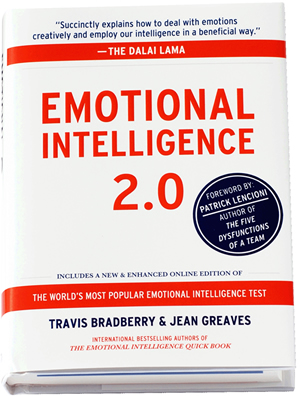 Today I want to review a somewhat different book, one that has nothing to do with youth ministry, isn’t written by Christian authors (even has an unfortunate quote of the Dalai Lama on the front jacket) but still could be very helpful to you and your students. I’m talking about Emotional Intelligence 2.0
Today I want to review a somewhat different book, one that has nothing to do with youth ministry, isn’t written by Christian authors (even has an unfortunate quote of the Dalai Lama on the front jacket) but still could be very helpful to you and your students. I’m talking about Emotional Intelligence 2.0.
Emotional intelligence (EQ) is about effective communication between the rational and emotional centers of the brain. Everything you experience via your senses, must travel via your limbic system (where your emotions are experienced to the front of your brain where you think rationally. Emotional intelligence is your ability to recognize and understand emotions in yourself and others, and then use this awareness to manage your behavior and relationships.
EQ plays a massively important role in life, especially in our jobs. People with the highest IQ’s outperform those with average IQ’s only 20 percent of the time, while average Joes outperform those with high IQ’s 70 percent of the time. To succeed, it’s not about IQ, it’s about EQ.
Only 36 percent of the people are able to accurately identify their emotions as they happen. That means most of us are controlled by our emotions and aren’t able (yet) to manage our emotions. Which could explain some of the nasty shouting matches we see even amongst Christians.
Obviously in youth ministry, it’s not about succeeding the same way as it is in the business world, but we could still profit from investing in our EQ’s. And not just that, but more knowledge and better insights in how EQ works can also help us to help our youth better.
The good news is that emotional intelligence can be learned and that’s where Emotional Intelligence 2.0 comes in. It’s a very practical self-help guide to improving your EQ. The book describes four skills that make up emotional intelligence, two personal and two social competences:
- Self awareness: your ability to accurately perceive your own emotions in the moment and understand your tendencies across situations
- Self management: your ability to use your awareness of your emotions to stay flexible and direct your behavior positively, managing your emotional reactions to situations and people
- Social awareness: your ability to accurately pick up on emotions in other people and understand what is really going on with them
- Relationship management: your ability to use your awareness of your own emotions and those of others to manage interactions successfully
In a very short introduction the theories of emotional intelligence are explained, but the biggest part of the book are practical strategies you can start using to increase your EQ in whatever area you’re weak in (you can discover which areas that are by taking the corresponding online test – it’s free with the access code given in the book). And these are really helpful, also for teaching to young people who wrestle with their emotions.
The idea is to make a personal action plan to improve your IQ, but you could make one with one of your young people as well. As I mentioned in the review of Generation iY, the current generation of young people for the most part lacks emotional intelligence. This book could be a great tool in helping them develop those areas where they are weak, with you as their EQ mentor. The suggested strategies and exercises are very practical and easy to apply.
My conclusion: Emotional Intelligence 2.0 is a very practical self-help type of book that offers exactly what it promises: practical help in developing your EQ.
Leave A Comment